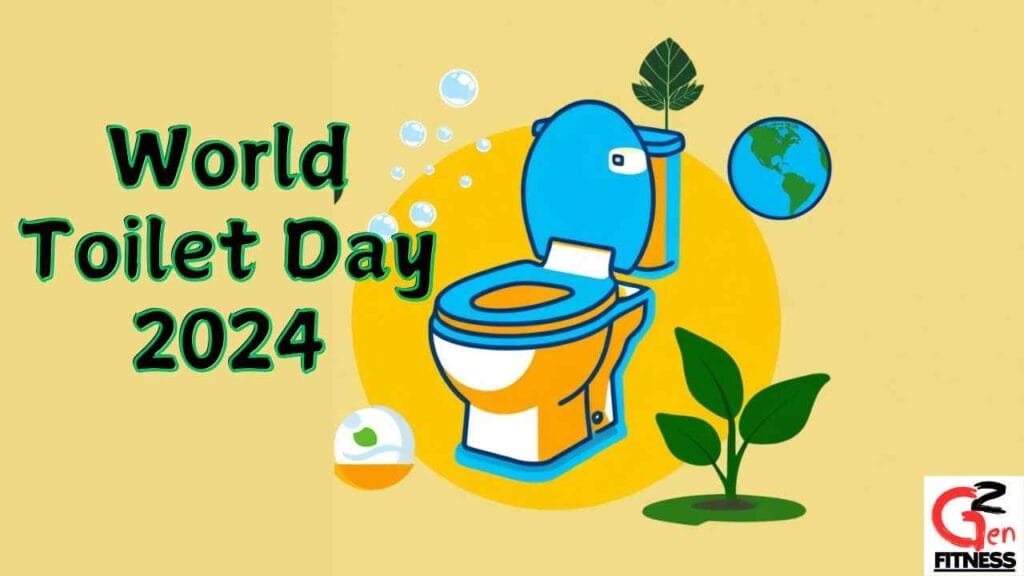

Introduction: World Toilet Day 2024
Have you ever thought about the importance of something as basic as a toilet? For many, access to proper sanitation is a luxury, not a given. This is precisely why World Toilet Day, observed annually on November 19, holds such significance. Organized by the United Nations (UN) and other global entities, this day emphasizes the importance of safe sanitation for all. As we look forward to World Toilet Day 2024, let’s explore its theme, history, significance, and key facts, and understand why toilets are a cornerstone of public health, dignity, and development.
What is World Toilet Day?
World Toilet Day is more than just a day to reflect on sanitation—it’s a global call to action. Established to break the silence around sanitation issues, this day aims to address the needs of the 4.2 billion people worldwide who lack access to safely managed sanitation systems.
The UN formally recognized World Toilet Day in 2013, but its roots trace back to 2001, when social activist Jack Sim founded the World Toilet Organization (WTO). The day symbolizes the fight for clean water, improved hygiene, and accessible toilets for everyone.
Current Theme for World Toilet Day 2024
The theme for World Toilet Day 2024 is “Toilets – A Place for Peace“. The 2024 theme focuses on making toilets a safe and secure space for everyone. The campaign calls on governments to ensure that sanitation and water services are: accessible to everyone, resilient, effective, and shielded from harm
In 2023, the theme was “Accelerating Change,” which emphasized collective action to achieve sanitation for all by 2030, in line with the Sustainable Development Goal 6 (Clean Water and Sanitation). Expect 2024’s theme to follow suit, addressing innovative strategies and inclusive solutions.
Previous Themes and Their Impact
Reflecting on past themes helps understand how far the movement has come. Here are the themes from the last five years:
- 2023: Accelerating Change
- 2022: Sustainable Sanitation and Groundwater
- 2021: Valuing Toilets
- 2020: Sustainable Sanitation and Climate Change
- 2019: Leaving No One Behind
- 2018: When nature calls
- 2016: Toilets and Jobs
Each theme contributed to raising awareness about critical issues, spurring governments, NGOs, and individuals into action. For instance, the 2021 theme highlighted the economic and social value of toilets, leading to innovative funding models for sanitation projects.


The History of World Toilet Day
The journey of World Toilet Day began with a simple idea: to give toilets the recognition they deserve. In 2001, Jack Sim, a passionate sanitation advocate, founded the World Toilet Organization. His mission? To draw attention to the global sanitation crisis.
The UN officially adopted the day in 2013, making it a part of its campaign to achieve universal sanitation by 2030. Since then, World Toilet Day has evolved into a platform for policymakers, communities, and organizations to discuss and implement transformative solutions.
The Role of Jack Sim in Initiating the Movement
Known as “Mr. Toilet,” Jack Sim is the driving force behind this global movement. A Singaporean entrepreneur, Sim turned his focus to public health after realizing the taboo surrounding sanitation. He established the World Toilet Organization, a nonprofit dedicated to improving global sanitation.
Sim’s work has earned worldwide recognition, proving that toilets are not just about convenience—they are about human dignity, safety, and health.
Why is World Toilet Day Important?
The significance of World Toilet Day goes far beyond acknowledging toilets as a basic necessity. It serves as a reminder of the global sanitation crisis that disproportionately affects marginalized communities, especially in developing countries. Without proper sanitation, individuals face risks to their health, safety, and dignity, making this day critical in raising awareness and pushing for actionable change.
Global Sanitation Crisis Statistics
The numbers paint a grim picture. According to the World Health Organization (WHO), approximately 3.6 billion people live without access to a toilet that safely manages human waste. Of these, nearly 494 million people still practice open defecation, leading to severe health and environmental issues.
Beyond these statistics lies a harsh reality: a lack of sanitation contributes to disease outbreaks, particularly waterborne diseases such as cholera, diarrhea, and dysentery, which kill hundreds of thousands of people annually, primarily in low-income regions.
Connection to the Sustainable Development Goals (SDGs)
World Toilet Day is closely tied to SDG 6: Clean Water and Sanitation for All. This goal emphasizes the need to ensure equitable access to safe sanitation and hygiene by 2030. However, progress remains slow, and without accelerated action, the world risks falling short of this target. World Toilet Day shines a spotlight on this issue, mobilizing governments, NGOs, and individuals to prioritize sanitation in their agendas.
Linking Toilets to Health
It might be hard to imagine, but the absence of a toilet can be a matter of life and death. Here’s how:
Impact of Poor Sanitation on Health
Lack of proper toilets results in contamination of water sources and widespread transmission of waterborne diseases. Every year, diarrheal diseases caused by poor sanitation claim the lives of over 525,000 children under the age of five. It’s not just about survival; it’s about ensuring every person has the opportunity to live with dignity and health.
Prevention of Waterborne Diseases
Proper sanitation reduces the burden of disease significantly. For instance, providing access to safe toilets and clean water could reduce diarrheal cases by up to 58%. This demonstrates how toilets can act as a frontline defense in public health systems.
Toilets and Education
Did you know that the absence of toilets impacts education, especially for girls? This issue is often overlooked, but it has far-reaching implications.
Lack of Facilities in Schools
Globally, many schools lack functional toilets or clean water facilities, forcing students to either skip school or drop out entirely. For girls, the situation worsens during menstruation due to the lack of privacy or proper hygiene facilities.
Effect on Children, Especially Girls
When schools provide safe and clean toilets, attendance improves dramatically. Studies have shown that ensuring toilet access can increase school enrollment for girls by up to 11%, emphasizing how sanitation can empower education.
Key Facts of World Toilet day
To understand the global sanitation landscape better, let’s dive into some key facts:
- Access: Around 2 billion people globally lack access to basic sanitation services, such as toilets or latrines.
- Open Defecation: Despite improvements, nearly 9% of the world’s population practices open defecation, primarily in rural areas.
- Economic Impact: The lack of sanitation costs developing countries approximately $260 billion annually in lost productivity and health-related expenses.
- Technological Innovations: Countries like India and Kenya are pioneering eco-friendly toilets that convert waste into fertilizer or energy, showcasing the potential for sustainable solutions.
- Cultural Practices: Sanitation practices vary widely across cultures, influencing how toilets are designed, used, and maintained.
Events and Activities on World Toilet Day 2024
World Toilet Day is marked by various events and campaigns aimed at raising awareness and driving change.
Campaigns and Initiatives
Governments, NGOs, and corporations collaborate to host awareness drives, workshops, and media campaigns. These initiatives aim to break the stigma around sanitation and encourage investment in sanitation infrastructure.
Government and NGO Participation
Many governments announce new sanitation policies or pledge additional funding for toilet construction in underserved areas. NGOs often organize grassroots efforts, bringing sanitation education to local communities.
Grassroots Efforts
Grassroots organizations play a pivotal role by educating communities on the importance of hygiene, providing resources, and facilitating the construction of low-cost toilets in rural areas.
How to Contribute to World Toilet Day
Want to make a difference? Here’s how you can contribute:
Individual Actions to Promote Sanitation
- Advocate for sanitation by talking about its importance with your family, friends, and on social media.
- Participate in local events or campaigns supporting sanitation projects.
Volunteering Opportunities and Donations
- Join organizations working on sanitation initiatives as a volunteer.
- Donate to charities and NGOs that build toilets in underprivileged areas.
Spreading Awareness Through Social Media
Use platforms like Twitter, Instagram, and LinkedIn to share facts, personal stories, or even the World Toilet Day theme. A single post can spark a chain of awareness.
Challenges in Achieving Sanitation for All
Despite progress, achieving universal sanitation is fraught with challenges.
Urbanization and Slum Conditions
Rapid urbanization has created overcrowded slums where sanitation systems are inadequate or non-existent. These conditions make it difficult to provide access to safe toilets.
Funding and Resource Limitations
Sanitation infrastructure is costly, and many developing countries lack the financial resources to implement large-scale solutions. International aid and innovative funding models are needed to bridge the gap.
Climate Change and Sanitation
Climate change poses a new set of challenges for sanitation systems.
- Impact of Extreme Weather: Floods and droughts disrupt sewage systems, contaminating water supplies and exacerbating health risks.
- Need for Resilient Infrastructure: Designing toilets that can withstand extreme weather conditions is essential for future sanitation efforts.
Success Stories in Sanitation
Several countries have made remarkable strides in improving sanitation:
- India: The Swachh Bharat Abhiyan (Clean India Mission) constructed over 100 million toilets, drastically reducing open defecation rates.
- Bangladesh: A focus on community-led total sanitation has helped achieve significant improvements in rural hygiene.
- Rwanda: Investments in eco-friendly toilets and public awareness campaigns have transformed sanitation in urban areas.
Future Outlook for Global Sanitation
The road ahead requires collaboration, innovation, and commitment. As we approach 2030, achieving universal sanitation will depend on:
- Governments prioritizing sanitation in national policies.
- Increased private sector involvement to fund and develop innovative toilet technologies.
- Strengthening global partnerships to share resources and expertise.
Conclusion
World Toilet Day 2024 reminds us that sanitation is not just a convenience—it is a human right. Toilets save lives, protect dignity, and enable progress. By participating in this global movement, we can help ensure that no one is left behind in the journey toward universal sanitation.
FAQs
What is the theme for World Toilet Day 2024?
The theme for World Toilet Day 2024 is “Toilets – A Place for Peace”.
When was World Toilet Day first celebrated?
World Toilet Day was first celebrated in 2001 and officially recognized by the UN in 2013.
Why is sanitation important for education?
Sanitation impacts education by providing safe facilities that reduce absenteeism, especially for girls during menstruation.
What are some innovative toilet technologies?
Innovations include eco-toilets that convert waste into energy, composting toilets, and waterless systems designed for climate resilience.
Read our latest articles- https://genzfitness.in/
Read our latest book- https://eatyourproblems.store/





